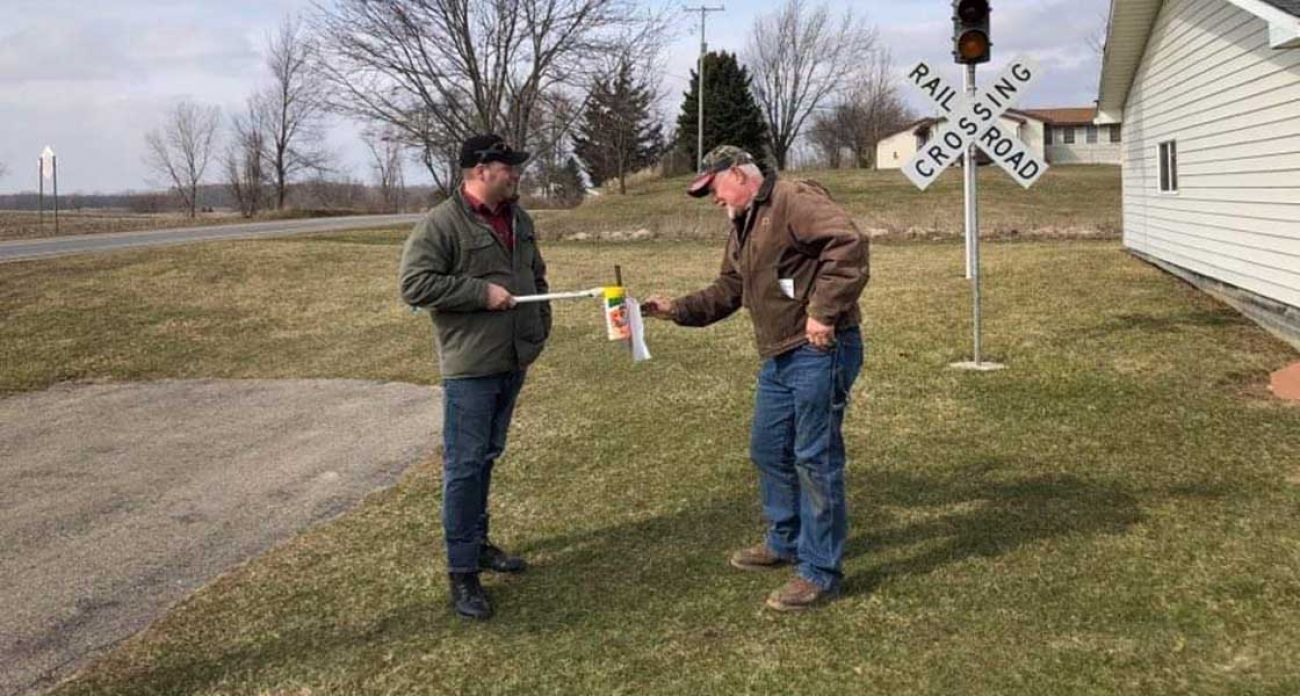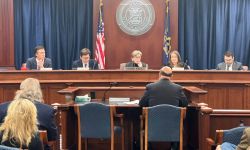Toilet paper for donors? Coronavirus forces Michigan campaigns to get creative

It’s a question Michigan congressional and judicial candidates never saw coming: How do you collect voter signatures needed to make the ballot amid a global pandemic that requires social distancing for public health?
One has sued, arguing Michigan Gov. Gretchen Whitmer’s stay-at-home order makes it impossible for congressional and judicial candidates to meet an April 21 deadline. Others are urging the state to push back the deadline or to mail petitions to supporters to sign at home.
Tom Norton, who said he’s tested negative for COVID-19, has gotten creative.
The former Sand Lake village president in Kent County built a “contraption” to collect signatures while social distancing. It’s a metal pole he can use to extend a clipboard, pen and sanitizer wipes to an individual voter.
- The latest: Michigan coronavirus map, locations, updated COVID-19 news
- What Michigan’s coronavirus school closure means for you
- What Michigan’s coronavirus stay-at-home order means for residents
- What jobs are exempt from Michigan coronavirus lockdown? You may be surprised.
“It works great,” said Norton, who is running for Congress and has filed multiple patent applications on the doohickey. “Usually people open the door, look at it and just start laughing” and some do sign.
While Norton’s solution is unique — and may violate Whitmer’s order — his dilemma is not.
Unlike legislative candidates who can make the ballot just by paying a $100 fee, Michigan congressional candidates must collect and submit at least 1,000 valid signatures from voters in their district by April 21. Non-incumbent judicial candidates must submit 100 to 6,200 signatures by the same date, depending on the court.
That can be a challenge under normal circumstances, but especially now given the deadly coronavirus pandemic.
Most congressional candidates who spoke with Bridge are staying home in accordance with Whitmer’s emergency public health order, which also bans rallies and large public gatherings that are popular opportunities to collect signatures.
Michigan confirmed its first coronavirus case the night of the state’s March 10 presidential primary, and the outbreak has fundamentally altered campaign season.
Political parties are planning virtual meetings, campaigns have moved online, candidates have canceled in-person fundraisers and — for many — partisan mudslinging has ebbed.
“One thing that is for certain is that business as usual right now is unacceptable,” said Jamie Roe, a Macomb County Republican consultant with the Grand River Strategies firm.
“If you’re campaigning like people’s lives haven’t been thrown into upheaval, then you don't deserve to be elected because you just aren’t connected with what’s going on in people’s lives.”
Benson seeks delay
Whitmer’s stay-at-home order — if it’s not extended before then — will expire April 14, leaving judicial and congressional candidates one week to resume public signature collection efforts.
Even then, federal social distancing guidelines will remain in place through the end of April.
Michigan Secretary of State Jocelyn Benson has asked Whitmer for an executive order extending the deadline by three weeks to May 12. The governor has not yet granted that request or said publicly whether she will do so.
Eric Esshaki, a Birmingham Republican running in Michigan’s 11th Congressional District, sued the state in federal court on Tuesday, arguing there is no legitimate reason to enforce the deadline given the “unprecedented circumstances” of the pandemic and stay-at-home order.
“Absent the issuance of a temporary restraining order, Esshaki will incur irreparable injury because his name will not appear on the August 4, 2020, primary election ballot and he and his supporters will be deprived of a meaningful opportunity to vote for him,” his attorney wrote in a court complaint.
Esshaki, who hopes to take on Democratic Rep. Haley Stevens in the general election, has collected nearly 700 signatures so far, about 300 shy of the requirement, according to court documents.
There are at least 72 declared congressional candidates or incumbents expected to run for re-election in Michigan, according to records tallied by Ballotpedia. To date, state records show 16 have filed required signatures to ensure a spot on the August primary ballot.
Some may simply be sitting on signatures for strategic reasons, waiting to submit until the deadline so that opposition campaigns have less time to review petitions for possible challenges. Others told Bridge they have enough but are building a “cushion” in case some signatures are invalidated.
An incumbent advantage?
Political experts say shifting electoral dynamics may favor incumbents who have strong name recognition, fundraising connections and campaign teams that have already deployed paid or volunteer circulators to collect required signatures.
“It does make it harder for challengers, unless they’ve got some other means to make it up, like if they’re personally wealthy,” said Mark Brewer, an attorney and former chairman of the Michigan Democratic Party.
That’s especially true for judicial incumbents, who do not have to file signatures. Only challengers or candidates for open bench seats must circulate petitions under Michigan law.
The deadline could be difficult for late-filing candidates like Brenda Jones, the Detroit City Council president who is running for congress and this week announced she’s tested positive for COVID-19.
Jones wants to oppose U.S. Rep. Rashida Tlaib in the 13th Congressional District primary. That would set up a rematch from 2018, when Jones narrowly won a special primary election and filled a vacant congressional seat for five weeks but Tlaib narrowly won the regular primary and went on to serve a full two-year term.
Jones filed a statement of candidacy on March 18, five days before Whitmer’s order.
Her campaign had already collected “some signatures” and “is currently researching all legal ways to collect additional signatures in this COVID-19 pandemic environment,” according to a statement provided to Bridge.
But it’s not clear how many she’s collected.
“What’s she supposed to do?” said Adrian Hemond, a Democratic political strategist with the Grassroots Midwest consulting firm in Lansing.
“If we’re just going to tell her she shouldn’t get those signatures, does that just mean Congresswoman Tlaib gets a free pass?”
Candidates deliver food, toilet paper
Norton, who designed the social distancing signature collection device, is one of six declared candidates in the 3rd Congressional District Republican primary. The winner will face the Democratic nominee and incumbent U.S. Rep. Justin Amash, who is running for re-election as an independent after leaving the GOP and voting to impeach President Donald Trump.
The coronavirus pandemic has radically redefined the contours of one of Michigan’s most closely watched primaries.
Peter Meijer, the Republican heir to the west Michigan grocery chain, has morphed his campaign into Operation FRED, a food relief emergency delivery service for residents in need. His campaign is buying food — not just at Meijer — and has so far delivered more than 10,000 meals in the district and beyond.
“These are people who were not preparing to have to stay at home for several weeks, who aren’t able to go shopping and they can’t afford it or don’t have other people who can help them shop,” said Meijer, who added he’s already met signature requirements.
“We’ve been really humbled by a lot of the demand and need in the community.”
State Rep. Lynn Afendoulis, who also is competing in the 3rd Congressional District Republican primary, has turned her social media accounts into coronavirus education feeds and has been focusing on connecting with constituents as part of her day job.
“Her office has been fielding so many calls” and she personally returns as many as possible, said Peter Towey, a general consultant for Afendoulis’ congressional campaign.
She had planned to collect signatures at large events like a women’s expo that was cancelled and is now mailing petitions instead. "We will be on the ballot regardless if there is a change to the signature requirement or not,” Towley said.
Roe, a general consultant working for Meijer and 10th Congressional District candidate Shane Hernandez, said the coronavirus has made campaign fundraising “incredibly difficult.”
“You can’t have gatherings, and the fact is that in this time of uncertainty, people are less likely to prioritize their discretionary spending on campaigns,” he said. “That, I think, is going to impact everybody before it’s all said and done.”
Norton, who already faced a campaign cash deficit, last week offered to personally deliver a roll of toilet paper to his highest daily donor, a pledge he said he’ll follow through on soon.
Considered a longshot, Norton launched his campaign nearly a year ago, giving him a head start on signature collection. He was able to collect most of what he needed before the pandemic hit.
“We’re extremely close,” Norton said. “We should be able to pull off what we need” if the governor’s stay-at-home order is lifted on April 14 and “we’re back up” for the final week.
No more kissing babies
While social distancing has pushed campaigns to rely even more on social media, candidates are missing out on what experts say is their most effective form of communication: In-person contact with voters.
“Every study of the effect of political persuasion has concluded, easily, it’s clear that personal contact is best,” Brewer said. “Whether it’s going door-to-door or meeting someone at an event, that’s what has been lost here. You can’t do it in, most cases, and people are afraid.”
Democratic presidential hopefuls Joe Biden and Bernie Sanders have not held public rallies since Michigan primary week. Instead, they’ve held virtual town halls, and in Biden’s case, even a virtual fundraiser.
Trump Victory, the joint committee working to re-elect the president, went fully digital on March 13 and shifted volunteer training to Zoom and other streaming platforms.
The pandemic hasn’t slowed campaign phone calls, but it’s flipped the script.
Coronavirus is now the “main focus,” said Michael Joyce of the Republican National Committee. Volunteers ask voters about their health, federal resources and actions the president has taken, he said.
In-person circulation is typically the most cost effective way to collect petition signatures to make the ballot. But several congressional candidates who spoke with Bridge Magazine are now utilizing a more expensive option: mailing ballots to supporters, which requires staff, stamps and envelopes.
“I’ve always liked to do signatures in person, because you can speak with people that you’ve never met before,” said Gretchen Driskell, a Democrat and former state lawmaker running for congress in Michigan’s 7th Congressional District. “It’s a way to touch base and make connections, which I think is really important. But it’s obviously not an option.”
Driskell said her campaign is “more than halfway” toward the 1,000 signature threshold but had been planning a big push at public events over St. Patrick’s Day weekend. She’s still “confident” they’ll get enough signatures through the mail.
Esshaki, the Birmingham attorney who sued the state this week, argued that is not a viable approach for his campaign. Mailing petitions would require him to “spend large sums of money” even though “there is no evidence that such a strategy would yield even one additional signature,” Esshaki’s attorney said in the complaint.
Mike Detmer, a Republican running in the 8th Congressional District, said he and his campaign are essentially “hunkered down” because of the governor’s stay-at-home order. He’s been engaging with voters through Facebook Live videos but not leaving the home.
Detmer said his campaign had already collected about 1,000 signatures but was working to collect a “couple hundred” extra to protect against potential challenges. He also had volunteers set to collect at spring events, including a St. Patrick’s Day parade two weeks ago.
“And then all that got shut down, so we’re kind of stuck just like everybody else,” he said. “We really need to push the governor. She has it in her power to extend out this deadline.”
RESOURCES:
- Michigan families can get food, cash, internet during coronavirus crisis
- How to give blood in Michigan during the coronavirus crisis
- 10 ways you can help Michigan hospital workers right now
- Michigan coronavirus Q&A: Reader questions answered
- How to apply for Michigan unemployment benefits amid coronavirus crisis
- How to get tested for coronavirus in Michigan
See what new members are saying about why they donated to Bridge Michigan:
- “In order for this information to be accurate and unbiased it must be underwritten by its readers, not by special interests.” - Larry S.
- “Not many other media sources report on the topics Bridge does.” - Susan B.
- “Your journalism is outstanding and rare these days.” - Mark S.
If you want to ensure the future of nonpartisan, nonprofit Michigan journalism, please become a member today. You, too, will be asked why you donated and maybe we'll feature your quote next time!




